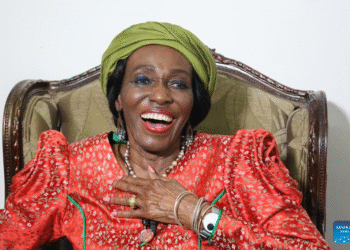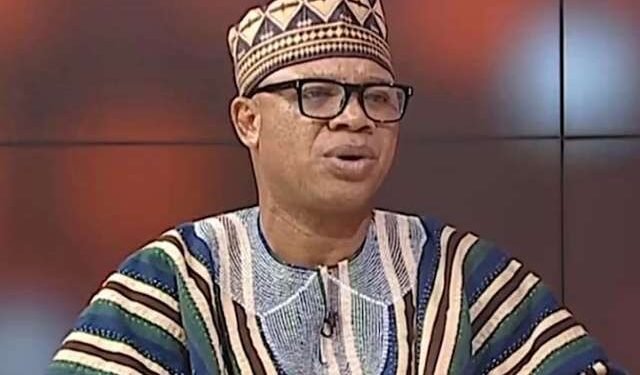In recent years, a growing chorus of well-meaning Ghanaians has raised alarms about the dangers posed by partisan politics and its associated winner-takes-all syndrome.
Many believe that the binary struggle for the exclusive control of the presidency by the two main political parties, the New Patriotic Party (NPP) and the National Democratic Congress (NDC), lies at the heart of much of what ails the country.
This partisan fight is seen as a source of division, corruption, and inefficiency, threatening the very fabric of Ghana’s democracy.
This ongoing battle for power, in the view of many critics has overshadowed the true purpose of governance to serve the people and has rather created a system where the interests of political parties often trump national interests.
Professor H. Kwesi Prempeh, a renowned lawyer and Executive Director of the Ghana Centre for Democratic Development has articulated a comprehensive and transformative solution to this problem.
In his compelling argument, Professor Prempeh strongly posited that the time has come for Ghana to consider deep constitutional innovation to save its fragile democracy, emphasizing that the root cause of the country’s political and governance issues is the combination of “presidentialism” and “binary, winner-take-all partisan politics”.
“The binary partisan fight for exclusive control of the presidency is at the root of much if not all, that is wrong with our politics and governance. The combination of presidentialism and binary, winner-take-all partisan politics yields toxic results on our part.
“The remedy? Decouple the one from the other; take political parties out of the presidency. Let’s choose our presidents on a no-party/nonpartisan basis, restricting our political parties to parliamentary elections”.
Professor H. Kwesi Prempeh, Executive Director of the Ghana Centre for Democratic Development
Professor Prempeh further asserted that the partisan presidency is a principal millstone around Ghana’s neck, poisoning elections and institutions, retarding governance and development aspirations, and putting the country’s democracy in peril.
He drew a parallel with the country’s judiciary, where partisan competition is not allowed, and suggested that presidential elections need not be partisan either.
The Executive Director of the Ghana Centre for Democratic Development also asserted that the idea of electing presidents on a nonpartisan basis is not entirely foreign, adding that many democracies elect chief executives at the local government level without party affiliation.
Professor Prempeh argued that there is no reason why such practice cannot be tried at the national level in Ghana, emphasizing that the historical home of political parties is the legislature, where rival interests can compete over ideas and legislation, not the presidency, which should represent the whole country.
The experience in Ghana’s Fourth Republic, according to Professor Prempeh, shows that the separation of powers and checks and balances between the legislature and the executive often breaks down in practice.
He posited that when the President and the majority in Parliament are from the same party, Parliament becomes a rubber stamp, failing in its oversight role, while conversely, when a partisan President faces a Parliament dominated by a rival party, gridlock ensues, hampering governance, adding that both scenarios are detrimental to good governance.
“These weaknesses of party-based presidentialism are, of course, not peculiar to Ghana; they are experienced, in varying degrees, also by countries where, like Ghana, two rival and polarizing parties dominate the electoral competition for both the legislature and the presidency.
“Such countries, too, could benefit from rethinking this model of party-based presidentialism. But my primary and immediate concern is Ghana. Thus, what I propose here, while relevant or applicable to similar contexts elsewhere, is meant as a Ghanaian solution to a Ghanaian problem”.
Professor H. Kwesi Prempeh, Executive Director of the Ghana Centre for Democratic Development
Furthermore, Professor H. Kwesi Prempeh’s proposal for a nonpartisan presidency comes with a set of companion reforms designed to ensure its success and integrity.
These reforms include state-funded presidential campaigns, strict regulation of campaign spending, and a ban on political parties and foreign donations to presidential candidates, stating that campaign spending must be strictly regulated and audited.
This, in his candid view, would level the playing field for all Presidential Candidates and reduce undue influence on the candidate that would be elected as President.

Professor Prempeh also recommended that Presidential Candidates must secure widespread public endorsement, publicly declare their assets and liabilities, and produce manifestos aligned with the constitution’s directive principles of state policy.
Additionally, Professor Prempeh called for diverse executive representation with Presidential candidates selecting a running mate of the opposite sex to promote gender balance in leadership.
Here, he posited that the deputy President should become an ex officio voting member of Parliament, leading government business in the House.
Among several other recommendations, the Executive Director of CDD-Ghana called for a cap on the number of ministers appointed by the President, a ban on Members of Parliament serving concurrently as ministers, and a single nonrenewable six-year presidential term.
“A President may choose no more than 25% (one-fourth) of his or her Ministers from persons belonging to the same political party. The number of Ministers will be capped by an Act of Parliament. Also, no new Ministry can be created except by an Act of Parliament.
“No MP shall serve concurrently as Minister or hold any office in the executive branch or public services, but the Majority and Minority Leaders of the House will have the right to participate in all meetings of the Cabinet”.
Professor H. Kwesi Prempeh, Executive Director of the Ghana Centre for Democratic Development
Professor Prempeh’s proposed reforms included other companion reforms that will further bolster the integrity and functionality of the political system. These include competitive, meritocratic appointments to state-owned enterprises, administration of the President’s office by professional civil servants, and ongoing public accountability measures.
This proposal, while bold and innovative according to Professor Prempeh is not without its potential critics. He acknowledged that political parties and their partisans may object, as the Presidency and executive power are the primary prizes they seek.
However, he argued that the loss for the parties would be a collective gain for the nation, emphasizing that his proposed reforms if implemented would likely lead to the emergence of new parties and politicians more interested in contributing to governance than in accessing public resources.
Non-Partisan Presidency Aligns with Traditional African Governance
In addition, Professor Prempeh asserted that a nonpartisan presidency aligns better with traditional African governance, which is more consensus-driven.
He called on those who favour political systems modelled after indigenous traditions to support his proposed reforms.
In conclusion, Professor Prempeh’s call for a nonpartisan presidency is a radical departure from Ghana’s current political structure, and even more noteworthy is his thoughtful proposed reforms.
It offers a thoughtful and comprehensive solution to the deep-seated issues of partisan politics, aiming to restore integrity, efficiency, and unity to Ghanaian governance.
By adopting a nonpartisan approach to the presidency, Ghana can foster a more inclusive and effective governance model that prioritizes national interests over partisan gains.
READ ALSO: Ruto ‘Grilled’ For US Travel Expenses























